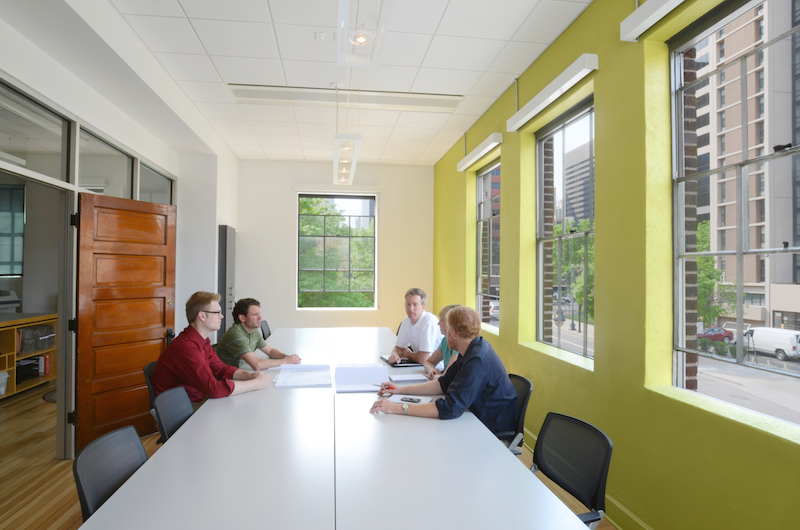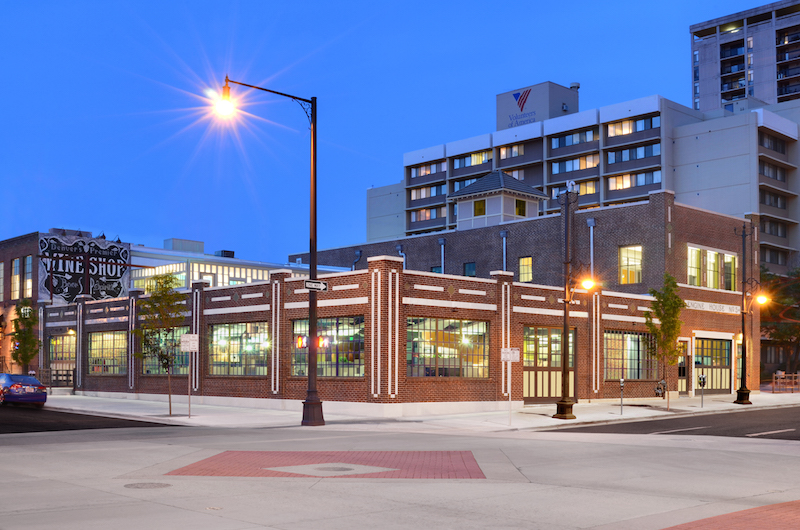The architectural firm Hord Caplan Macht (HCM) recently completed the documentation to verify that its Denver office can meet the standards necessary to be certified under Fitwel, a certification program to support healthier workplaces created by the Centers for Disease Control and Prevention. The Center for Active Design, Fitwel's oerator and third-party certifier, launched in May 2016 and began rolling out to developers and the AEC community last fall.
Working with experts in public health and design, CDC spent five years developing and testing its Fitwel scorecard. The General Services Administration piloted the program in 89 of its buildings.
HCM, which has also provided verification documents for its offices in Alexandria, Va., and Baltimore, is one of five Fitwel Champions that have committed to certifying more than 50 buildings in aggregate. The other Champions include the CDC, which is also Fitwel’s research and evaluation lead; EYP, Integral Group, and Menkes Development.
Perkins+Will was the first company to adopt Fitwel’s standards for all 11 of the firm’s North American offices, which P+W expects will be certified by 2018.
HCM has been in its 13,000-sf Denver office, a former fire station built in the 1920s, since 2010. The office currently has 72 employees. Ara Massey, that office’s Sustainability Design Manager, tells BD+C that the firm measured its three offices against 63 Fitwel strategies in seven health impact categories to establish health and wellness baselines from which it could work toward certification. The evaluation and documentation took about 40 man-hours, she estimates.
The Center for Active Design promotes Fitwel as more “business friendly” than other certification programs. And Massey confirmed that Fitwel gives companies the flexibility to prioritize which standards to align its operations with “without a lot of cost.”
HCM has already successfully integrated many health-promoting features within its offices, including providing staff with fresh fruit and vegetables and locating in areas with high WalkScores.

Hord Caplan Macht's Denver office includes meeting spaces with lots of daylight. Image: Courtesy HCM
However, one thing that surprised Massey was the emphasis that Fitwel’s scorecard places on “lactation rooms” for new Moms returning to the workforce after giving birth. “That was a real eye opener for us,” says Massey.
The next step toward Fitwel certification is the review process, and Massey expects a lot of give and take between her firm and the Center for Active Design to determine how to meet the criteria levels that HCM is willing to adopt.
Now bitten by the wellness bug, HCM also plans to incorporate Fitwel’s wellness standards into its designs for other clients’ projects “as much as possible,” says Massey. “Particularly active design.”
Arup, Structure Tone embrace wellness
While it’s still too early to say definitively, it appears that the wellness movement is slowly catching on with developers and AEC firms. For example, in late December, Arup opened a 16,333-sf office at 60 State Street in Boston, designed by Dyer Brown Architects, which is targeting the Silver level of the International WELL Building Institute’s WELL Building Standard, as well as the Platinum level of LEED v.4.
Structure Tone’s 82,000-sf corporate headquarters in New York City recently became the first project in that metro to receive Well Building Standard certification. It earned a Silver-level designation by installing more efficient mechanicals and lighting that maintains harmony with employees’ circadian rhythms. The office also offers point-of-access water filters, access to healthy foods, and discounts on bike-share and fitness center memberships.
Last year, Structure Tone formed a partnership with Delos, the real estate and tech firm that established the WELL Building Standard, in which Structure Tone agreed to accredit 150 employees through the WELL Accredited Professional program.
Related Stories
Codes and Standards | Mar 24, 2022
New York senate moves to speed up fossil fuel ban in new buildings
Lawmakers in the New York State Senate are backing a proposal to ban fossil fuels in new building construction three years sooner than a plan proposed by Gov. Kathy Hochul.
Codes and Standards | Mar 23, 2022
High office vacancies have cities rethinking downtown zoning
As record-high office vacancies persist in U.S. urban areas, cities are rethinking zoning policy.
Codes and Standards | Mar 22, 2022
Dept. of Energy awards $32 million for next-generation building retrofits
The U.S. Dept. of Energy has awarded a total of $32 million for more than 30 next-generation building retrofit projects that will dramatically improve affordable housing technologies, according to a DOE news release.
Legislation | Mar 18, 2022
New framework to help site community solar projects released
The Solar Energy Industries Association (SEIA) released a new report to aid policymakers in siting community solar projects.
Codes and Standards | Mar 17, 2022
Dept. of Energy seeks input on building-integrated photovoltaic systems
The U.S. Department of Energy (DOE) Solar Energy Technologies Office (SETO) and Building Technologies Office (BTO) recently issued a request for information to gather input on technical and commercial challenges and opportunities for building-integrated photovoltaic (BIPV) systems.
Legislation | Mar 16, 2022
Weak federal commercial real estate rules will hamper seizing Russian assets
Lax disclosure regulations that have made the U.S. a global hot spot for money laundering via real estate holdings will make it difficult for officials to seize properties from Russian oligarchs.
Codes and Standards | Mar 15, 2022
First company awarded Fitwel Certification in Senior Housing for Occupant Health & Wellness
The Springs at Greer Gardens in Eugene, Ore., is the first property to earn a Fitwel global health certification under the newly created senior housing scorecard.
Codes and Standards | Mar 10, 2022
HOK offers guidance for reducing operational and embodied carbon in labs
Global design firm HOK has released research providing lab owners and developers guidance for reducing operational and embodied carbon to meet net zero goals.
Codes and Standards | Mar 7, 2022
Late payments in the construction industry rose in 2021
Last year was a tough one for contractors when it comes to getting paid on time.
Codes and Standards | Mar 7, 2022
Massachusetts proposed energy code changes don’t ban gas
Proposed changes to the Massachusetts energy code would provide incentives for builders to fully electrify buildings, but not impose a ban on natural gas hookups.

















